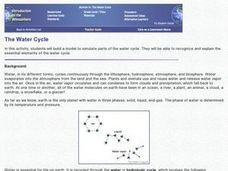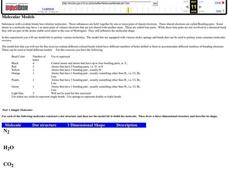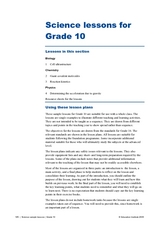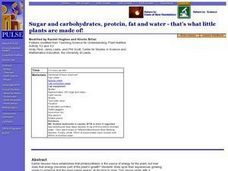NOAA
What's the Big Deal?
Who knew that a possible answer to Earth's energy resource problems was lurking deep beneath the ocean's surface? Part four of a six-part series introduces Earth Science pupils to methane hydrate, a waste product of methanogens. After...
Curated OER
Do You Know the Master Programmer?
Fourth graders, using candy, build models of DNA replication, RNA transcription, and tRNA translation.
Curated OER
Lipids, Amines, Amides
In this lipids, amines, and amides instructional activity, students answer nine questions about formulas and structures of these molecules. They also complete chemical equations giving the products of the reactions. They also indicate...
Curated OER
Isomer
In this isomer learning exercise, students use molecular model kits to build isomers. Students work in groups and draw and name the isomers they build. They answer 9 questions about both geometric and structural isomers.
Curated OER
Catering Middle-School Science: Monomers, Polymers, and Macromolecules
Students investigate foods. In this biology lesson plan, students will conduct testing on different types of foods as they learn about different molecules that make them up. Students will also learn about the shapes of the molecules.
Curated OER
The Water Cycle--Model Simulation
Students build a model to simulate parts of the water cycle. They recognize and explain the essential elements of the water cycle.
Curated OER
Soap Bubble Chemistry
High schoolers investigate soap bubbles. For this soap bubble chemistry lesson, students observe a demonstration using pop-it beads to represent a soap molecule. High schoolers produce soap bubbles in the lab by making bubbles with a...
Curated OER
Beads, Balls, and Beakers
Students analyze the amount of space required to pack round objects. In this geometry lesson, students practice using space economically by practicing packing spheres into beakers. They then translate this concept to molecules being...
Curated OER
Water Cycle Activity
Learners build a model and observe the cycle of evaporation and condensation that occurs in the water cycle. They see how the water cycle works, such as water condensing on the side of the jar and drops precipitating into rain that...
Curated OER
Polymer
Students investigate polymers by completing 3 experiments. In this polymer lesson plan, students mix plastic with acetone, they create polyurethane foam, they make slime and build a polymer model once their polyurethane foam is set. ...
Curated OER
Matter, Matter
Students define vocabulary related to the parts of the atom. In this matter lesson, students navigate the web to find the structure and the forces that affect atoms. Students complete an experiment with positive and...
Curated OER
Heat Discrepancies
Students answer the question, "Why do Eskimos build houses out of ice to keep warm. Since heat goes from hot to cold, don¿¿¿t the ice walls take away the warmth inside the house?" They explain how snow or ice can actually be insulators.
Curated OER
Intro to Biology Chapters 1 & 2 Practice Test
Don't be fooled by the title - this biology quiz could serve as an AP biology or college-level biology quiz. Some of the molecules represented may be difficult to identify without seeing the textbook from which this is based. It could...
Curated OER
Desalination: Creating a Solar Still
To better understand how solar power can aid in creating desalinated drinking water, the class creates a model still. They will build a model of a solar still, make observations, and discuss how the process works. While the idea behind...
Serendip
How Do Biological Organisms Use Energy?
When an organism eats, how does food become energy? Young biologists follow glucose through the process of cellular respiration to the creation of ADP using a discussion-based activity. The resource also highlights conservation of mass...
Teach Engineering
Gumdrop Atoms
There's nothing sticky about the resource, unless you count the gumdrops! Scholars create a model of a lithium atom, complete with protons, neutrons, and electrons. It's just that these models are made with gumdrops and toothpicks.
Montana State University
Climb into Action!
Climate change affects even the largest and intimidating of landforms—even Mount Everest! A resource helps teach learners the connection between global climate change and its effects on Earth. Activities include videos, class discussion,...
Kenan Fellows
Unit 1: Introduction to Biotechnology
Biotechnology is big! Introduce the uses of biotechnology to science scholars with a fascinating, fact-filled unit. The first installment in a series of four biotechnology units covers the role biotechnology plays in human and...
Curated OER
Modeling DNA Structure
Students build their own DNA molecules using candy. In this science activity, students build DNA molecules using licorice and gumdrops. The activity includes the use of streaming videos from the teacher's domain.
Curated OER
Nutrient Biochemistry
In this nutrient biochemistry worksheet, students complete the blanks with information about nucleic acids and the process. Students also draw a figure referenced in the text given.
Curated OER
Molecular Models
In this molecule worksheet, students use a molecular model kit to build the molecule, draw a three-dimensional structure, and describe its shape. This worksheet has 2 graphic organizers.
Curated OER
Super Scientists Code
In this science worksheet, middle schoolers use the key code on the right to unscramble each of the scientists. They also match each of the scientists found to their correct description.
Curated OER
Science Lessons for Grade 10
Tenth graders identify the parts and functions of the cell. In this series of science lessons, 10th graders investigate crystal formation in covalent compounds. They investigate the factors affecting reaction rates.
Curated OER
Sugar and carbohydrates, protein, fat and water - that's what little plants are made of!
Students identify photosynthesis as the mechanism by which plants convert sunlight energy into a usable energy source for plant processes. They identify photosynthesis as the mechanism by which plants create a molecule that can be used...

























